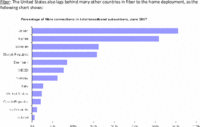
Shades of NSF:
EDUCAUSE, the association whose mission is to advance higher education by
promoting the intelligent use of information technology, today proposed
bringing the federal government, state governments, and the private
sector together as part of a new approach to making high-speed Internet
services available across the country.
The group, whose membership includes information technology officials
from more than 2,200 colleges, universities, and other educational
organizations, said that a new “universal broadband fund” would be
necessary so that “Big Broadband” — services of 100 mbps — could be
made widely available.
—
EDUCAUSE Proposes New Approach to Broadband Development,
Wendy Wigen, Peter B. Deblois,
EDUCAUSE,
29 Jan 2008
Back in the 1980s, in the time of standalone dialup Bulletin Board Systems (BBSes),
the National Science Foundation (NSF) deployed a nationwide backbone network
called NSFNet that eventually ran at the blazing fast for the times speed
of 1.55Mbps.
NSF also promoted development of NSFNet regional networks, many of which
eventually figured in the commercialization of Internet that took off
in 1991 when former dialup network UUNET started selling Internet connectivity
and former personnel of an NSFNet regional formed PSINet and also started
selling Internet connectivity.
Nowadays, when the fastest most people can get as so-called broadband
is 1-3Mbps DSL from telcos or maybe 3-5Mbps from cablecos,
maybe it’s time to do it again.
Is this a plan that would work?
Continue reading →
 Well, no. But at least the RIAA is against mandatory filtering by ISPs:
Well, no. But at least the RIAA is against mandatory filtering by ISPs:

 Matt Blaze has been spreading the word about a forthcoming paper
by him and a Who’s Who of Internet security experts (Steve Bellovin and Matt Blaze are pictured to the right).
Matt Blaze has been spreading the word about a forthcoming paper
by him and a Who’s Who of Internet security experts (Steve Bellovin and Matt Blaze are pictured to the right).
